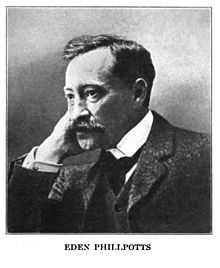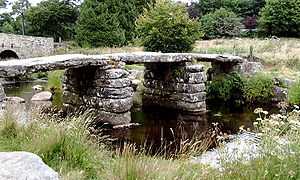Eden Phillpotts


Eden Phillpotts (4 November 1862 – 29 December 1960) was an English author, poet and dramatist. He was born in Mount Abu, British India, educated in Plymouth, Devon, and worked as an insurance officer for 10 years before studying for the stage and eventually becoming a writer.[1] He co-wrote two plays with his daughter Adelaide Phillpotts.[2]
He was the author of many novels, plays and poems about Dartmoor. His Dartmoor cycle of 18 novels and two volumes of short stories still has many avid readers despite the fact that many titles are out of print.
Phillpotts wrote many other books with a Dartmoor setting. He was for many years the President of the Dartmoor Preservation Association and cared passionately about the conservation of Dartmoor.
One of his novels, Widecombe Fair, inspired by an annual fair at the village of Widecombe-in-the-Moor, provided the scenario for his comic play The Farmer's Wife. It went on to become a silent movie of the same name, directed by Alfred Hitchcock and filmed in 1927. The cast included Jameson Thomas, Lillian Hall-Davis, Gordon Harker and Gibb McLaughlin.
He also wrote a series of novels each set against the background of a different trade or industry. Titles include: Brunel's Tower (a pottery) and Storm in a Teacup (hand-papermaking).
Among his other works is The Grey Room, the plot of which is centered on a haunted room in an English manor house. He also wrote a number of other mystery novels, both under his own name and the pseudonym Harrington Hext. Titles include: The Thing at Their Heels, The Red Redmaynes, The Monster, The Clue from the Stars, and The Captain's Curio.
The Human Boy[3] was a collection of schoolboy stories in the same genre as Rudyard Kipling's Stalky & Co., though different in mood and style.
Although mainly a novelist, he also wrote several plays, the most famous being Yellow Sands.
He was an agnostic and a supporter of the Rationalist Press Association.[4]
Late in his long writing career he wrote a few books of interest to science fiction and fantasy readers, the most noteworthy being Saurus, which involves an alien reptilian observing human life.
Phillpotts died in Broadclyst.
Phillpotts was a friend of Agatha Christie, who was an admirer of his work and a regular visitor to his home. Jorge Luis Borges was another admirer.[5] Borges mentioned him numerous times, wrote at least two reviews of his novels, and included him in his "Personal Library", a collection of works selected to reflect his personal literary preferences.
Works
Novels
| “ | A high wind laden with occasional showers flogged the Moor, hummed against the granite and set the dying herbage shivering with waves of colourless light. | ” |
| —The Mother (1908). | ||
- The End of a Life (1891)
- Folly and Fresh Air (1891)
- A Tiger's Club (1892)
- A Deal with the Devil (1895)
- Some Every-day Folks (1895)
- My Laughing Philosopher (1896)
- Down Dartmoor Way (1896)
- Lying Prophets: A Novel (1897)
- Children of the Mist (1898)
- Sons of the Morning (1900)[6]
- The Good Red Earth (1901)
- The River (1902)
- Old Delabole (1903)
- The Golden Fetich (1903)
- The American Prisoner (1904)
- The Farm of the Dagger (1904)
- The Secret Woman (1905)
- The Poacher's Wife (1906) AKA Daniel Sweetland (1906)
- The Sinews of War: A Romance of London and the Sea (1906) with Arnold Bennett
- Doubloons (1906) with Arnold Bennett
- The Portreeve (1906)
- The Whirlwind (1907)
- The Mother (1908)
- The Virgin in Judgment (1908) AKA A Fight to Finish (1911)
- The Statue: A Story of International Intrigue and Mystery (1908) with Arnold Bennett
- The Three Brothers (1909)
- The Fun of the Fair (1909)
- The Haven (1909)
- The Flint Heart: A Fairy Story (1910)
- The Thief of Virtue (1910)
- The Beacon (1911)
- Demeter's Daughter (1911)
- The Three Knaves (1912)
- The Forest on the Hill (1912)
- The Lovers: A Romance (1912)
- Widecombe Fair (1913)
- The Joy of Youth (1913)
- The Old Time Before Them (1913)
- Faith Tresilion (1914)
- The Master of Merripit (1914)
- Brunel's Tower (1915)
- The Green Alleys: A Comedy (1916)
- The Banks of Colne: (the Nursery) (1917)
- The Girl and the Faun (1917)
- The Spinners (1918)
- From the Angle of Seventeen (1912)
- Evander (1919)
- Storm in a Teacup (1919)
- Miser's Money (1920)
- Eudocia (1921)
- The Grey Room (1921)
- The Bronze Venus (1921)
- Orphan Dinah (1920)
- The Red Redmaynes (1922)
- Pan and the Twins (1922)
- Number 87 (1922)
- The Thing at Their Heels (1923)
- Cheat-the-boys; a Story of the Devonshire Orchards (1924)
- Redcliff (1924)
- The Treasures of Typhon (1924)
- The Lavender Dragon (1924)
- Who Killed Diana? (1924)
- Circé's Island (1924)
- A Voice from the Dark (1925)
- The Monster (1925)
- George Westover (1926)
- The Marylebone Miser (1926) AKA Jig-Saw (1926)
- Cornish Droll: A Novel (1926)
- The Miniature (1926)
- The Jury (1927)
- Arachne (1928)
- Children of Men (1928)
- The Ring Fence (1928)
- Tryphena (1929)
- The Apes (1929)
- The Three Maidens (1930)
- Alcyone (a Fairy Story) (1930)
- "Found Drowned" (1931)
- A Clue from the Stars (1932)
- The Broom Squires (1932)
- Stormbury, A Story of Devon (1932)
- The Captain's Curio (1933)
- Bred in the Bone (1933)
- Witch's Cauldron (1933)
- Nancy Owlett (1933)
- Minions of the Moon (1934)
- Ned of the Caribbees (1934)
- Portrait of a Gentleman (1934)
- Mr. Digweed and Mr. Lumb: A Mystery Novel (1934)
- The Oldest Inhabitant: A Comedy (1934)
- A Close Call (1936)
- The Owl of Athene (1936)
- The White Camel: A Story of Arabia (1936)
- The Anniversary Murder (1936)
- The Wife of Elias: A Mystery Novel (1937)
- Wood-nymph (1937)
- Farce in Three Acts (1937)
- Portrait of a Scoundrel (1938)
- Saurus (1938)
- Lycanthrope, the Mystery of Sir William Wolf (1938)
- Dark Horses (1938)
- Golden Island (1938)
- Thorn in Her Flesh (1939)
- Tabletop (1939) with Arnold Bennett
- Monkshood (1939)
- Chorus of Clowns (1940)
- Goldcross (1940)
- Awake Deborah! (1941)
- Ghostwater (1941)
- The Deed Without a Name (1942)
- Pilgrims of the Night (1942)
- A Museum Piece (1943)
- Flower of the Gods (1943)
- The Changeling (1944)
- The Drums of Dombali (1945)
- They Were Seven: (A Mystery) (1945)
- Quartet (1946)
- The Fall of the House of Heron (1948)
- Address Unknown (1949)
- The Waters of Walla (1950)
- Through a Glass Darkly (1951)
- George and Georgina: A Mystery Story (1952)
- His Brother's Keeper (1953)
- The Widow Garland (1955)
- Connie Woodland (1956)
- Giglet Market (1957)
- There Was an Old Man (1959)
Shortfiction Books
- My Adventure in the Flying Scotsman; a Romance of London and North-Western Railway Shares (1888)
- The Human Boy (1899)
- Loup-garou! (1899)
- Summer Clouds and Other Stories (1893)
- Fancy Free (1901)
- The Striking Hours (1901)
- The Transit of the Red Dragon: And Other Tales (1903)
- Knock at a Venture (1905)
- The Unlucky Number (1906)
- The Folf Afield (1907)
- Tales of the Tenements (1910)
- The Judge's Chair (1914)
- The Human Boy and the War (1916)
- Chronicles of St. Tid (1918)
- Black, White, and Brindled (1923)
- Up Hill, Down Dale: A Volume of Short Stories (1925)
- Peacock House and Other Mysteries (1926)
- It happened Like That, a New Volume of Short Stories (1928)
- Brother Man (1928)
- The Torch and Other Tales (1929)
- Cherry Gambol and Other Stories (1930)
- They Could Do No Other: A Volume of Stories (1932)
- Once upon a Time (1936)
- The Hidden Hand (1952)
Poetry
- Up-Along and Down-Along (1905)
- Wild Fruit (1911)
- The Iscariot (1912)
- Delight and Other Poems (1916)
- Plain Song (1917)
- A Shadow Passes'. [Observations and Poems] (1918)
- As the Wind Blows (1920)
- A Dish of Apples (1921)
- Pixies' Plot (1922)
- Thoughts in Prose and Verse (1924)
- Cherry-Stones (1924)
- A Harvesting (1924)
- Brother Beast (1928)
- Goodwill (1928)
- For Remembrance (1929)
- A Hundred Sonnets (1929)
- A Hundred Lyrics (1930)
- Becoming (1932)
- Song of a Sailor Man: A Narrative Poem (1933)
- Sonnets from Nature (1935)
- A Dartmoor Village (1937)
- Miniatures (1942)
- The Enchanted Wood (1948)
- One Thing and Another [Essays and poems.] (1954)
Plays
- The Prude's Progress: A Comedy with Jerome K. Jerome (1895)
- A Golden Wedding: An Original Comedy in One Act (1899)
- A Breezy Morning (1904)
- A Pair of Knickerbockers (1900)
- Curtain Raisers (1912)
- The Shadow; A Play in Three Acts (1913)
- The Mother: A Play in Four Acts (1914)
- The Secret Woman; A Play in Five Acts (1914)
- The Angel in the House: A Comedy in Three Acts (1915)
- Arachne; A Play (1920) By Adelaide Eden Phillpotts
- St. George and the Dragons: A Comedy in Three Acts (1919) AKA *The bishop's night out (1929)
- The Market-Money. A Play in One Act (1923)
- Bed Rock: A Comedy in Three Acts (1924)
- Devonshire Cream: A Comedy in Three Acts (1925)
- A Comedy Royal (1925) Dramatization of Eudocia (1921)
- Yellow Sands (1926)
- The Farmer's Wife (1926)
- The Blue Comet: A Comedy in Three Acts (1927)
- The Runaways: A Comedy in Three Acts (1928)
- Three Short Plays: The Market-money; Something to Talk about; The Purple Bedroom (1928)
- Buy a Broom: A Comedy in Three Acts (1929)
- Jane's Legacy: A Folk Play in Three Acts (1931)
- The Good Old Days: A Comedy in Three Acts (1932)
- Bert: A Play in One Act (1932)
- A Cup of Happiness: A Comedy (1933)
- At the 'bus-stop: A Duologue for Two Women (1943)
- The Orange Orchard (1951) Based on The Waters of Walla
Nonfiction
- In Sugar-Cane Land (1890)
- My Garden (1906)
- Dance of the Months. [Sketches of Dartmoor and poems.] (1911)
- My Shrubs (1915)
- My Devon Year (1916)
- One Hundred Pictures from Eden Phillpotts / Selected by L.H. Brewitt (1919)
- A West Country Pilgrimage (1920) [Essays and verse.]
- A West Country Sketch Book (1928) Essays from Dance of the Months and A West Country Pilgrimage with one new essay.
- Essays in Little (1931)
- Handmade Paper: Its Method of Manufacture as Described in the Novel "Storm in a Teacup" (1932)
- A Year with Bisshe-Bantam (1934)
- A Mixed Grill (1940) Essays.
- From the Angle of 88 (1951)
- Selected Letters (1984)
Omnibus
- Three plays: The shadows; The mother; The secret woman (1913)
- Circe's Island and The Girl & The Faun (1925)
- The Complete Human Boy. Comprising "The Human Boy," "The Human Boy Again," "The Human Boy and the War," "The Human Boy's Diary," "From the Angle of Seventeen," Etc. (1930)
- West Country Plays (1933) [Buy a Broom and A Cup of Happiness.]
- The Book of Avis: A Trilogy Comprising Bred in the Bone, Witch's Cauldron, A Shadow Passes [1936]
References
- ↑ "PHILLPOTTS, Eden". Who's Who, 59: p. 1396. 1907.
- ↑ Head, Dominic (ed.) (2006). The Cambridge Guide to Literature in English. Cambridge University Press. p. 868. ISBN 978-0-521-83179-6.
- ↑ Philpotts, Eden; The Human Boy; Pub: Harper & Brothers 1899
- ↑ "...among the honorary associates of the [Rationalist Press] Association, past and present, are distinguished names such as...Eden Phillpotts." Quoted in Lord Snell, Men, Movements And Myself, J.M. Dent and Sons, 1936 (pg. 156).
- ↑ Jorge Luis Borges: Conversations. University Press of Mississippi, 1998. Page 218.
- ↑ Phillpotts, Eden (1900). Sons of the Morning. Putnam. pp. 492 pages. Retrieved 2008-06-17.
Bibliography
- Day, Kenneth F. (1981). Eden Phillpotts on Dartmoor. Newton Abbot: David & Charles. ISBN 0-7153-8118-0.
- The New Cambridge Bibliography of English Literature, George Watson, Ian R. Willison CUP Archive, 1987
External links
| Wikisource has original works written by or about: Eden Phillpotts |
- Works by Eden Phillpotts at Project Gutenberg
- Works by or about Eden Phillpotts at Internet Archive
- Works by Eden Phillpotts at LibriVox (public domain audiobooks)

- Eden Phillpotts at the Internet Speculative Fiction Database
|